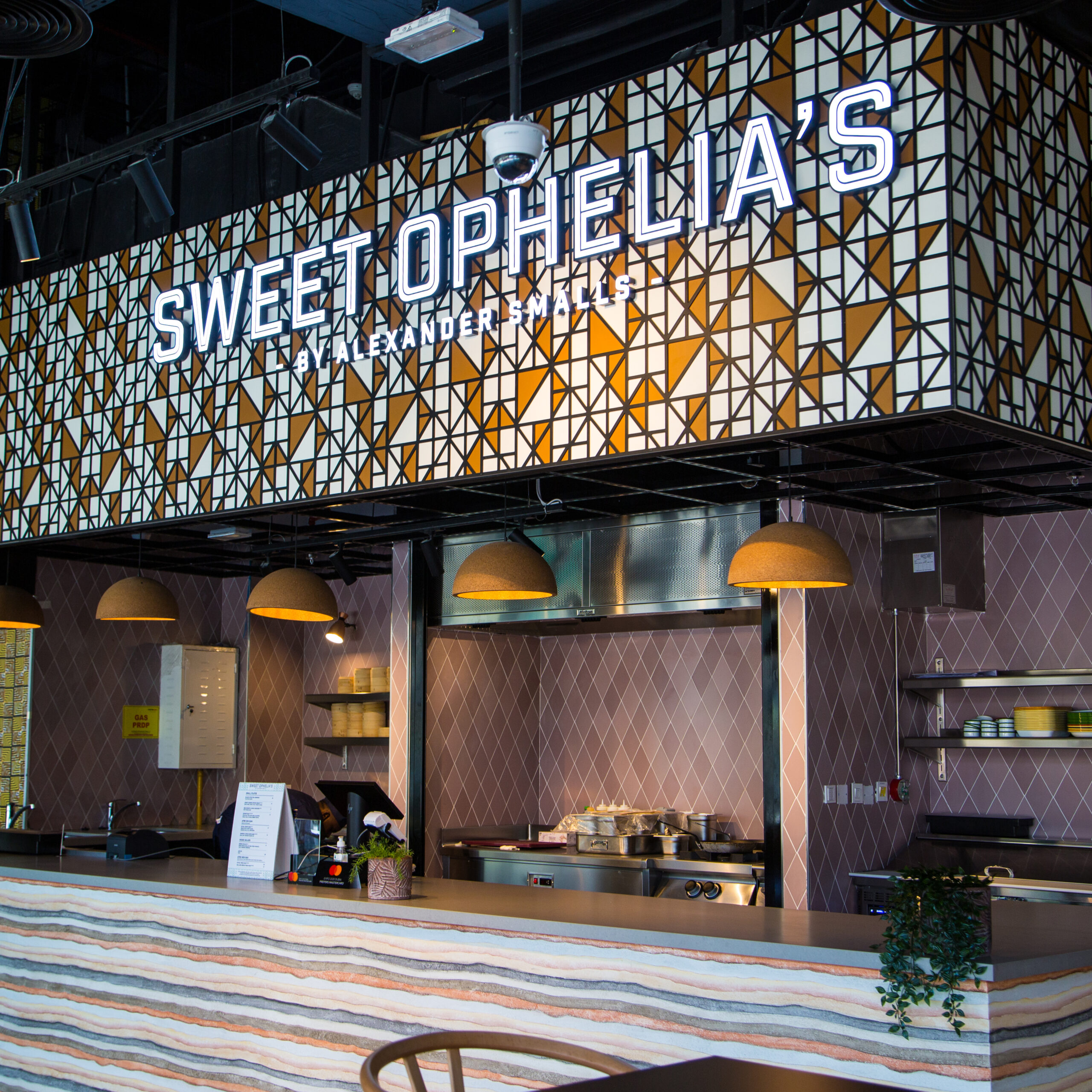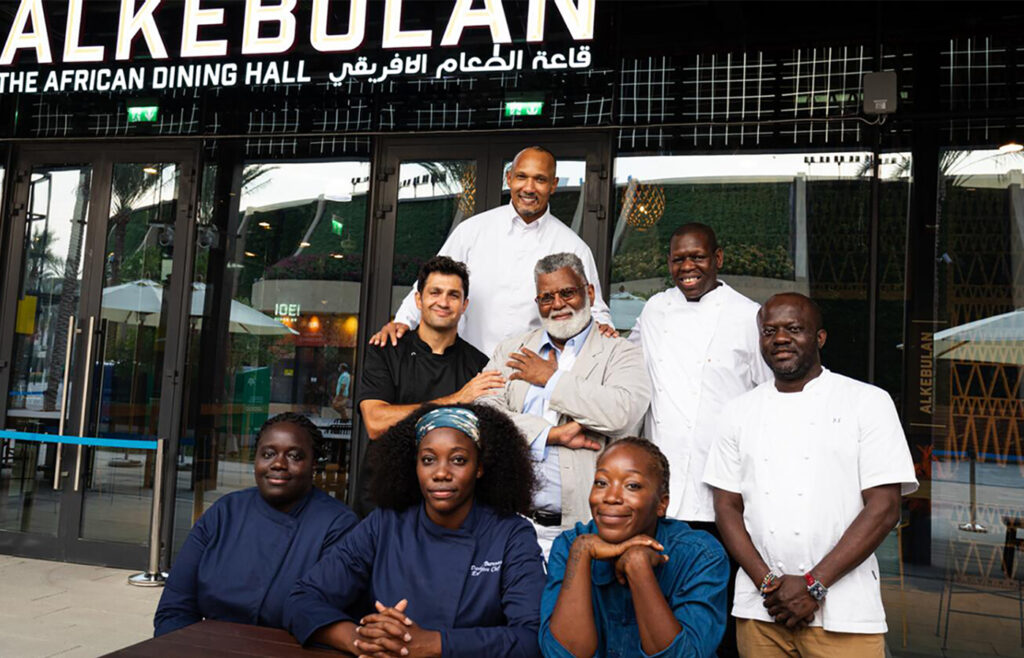Together Again
This month, as we gather in-person with family and friends for the start of the holiday season, we are reminded that gratitude is truly a gift.
- Nov.2021
The chef, restaurateur and opera singer is not only giving Africa’s food its due on the world stage, he’s also back in the recording studio after three decades.
By Stefanie Gans


“There’s something to be said about having an idea, a dream, a passion, putting it down on paper and then watching it leap in front of you into life,” says Alexander Smalls, who is an opera singer, chef, scholar and cookbook author, and with his way with words, might as well be a poet.
At the moment, Smalls is smitten with Alkebulan: The African Dining Hall now on display at Expo 2020 in Dubai, though March 2022. Alkebulan is the first written name for Africa, “before the Europeans got there with their nonsense,” says Smalls, the hall’s curator. The 22,000-square foot dining hall features the breadth and diversity of African food, from cocktails inspired by East Africa’s tribes (e.g.: Burning Belly is an ode to the world’s best athletes and uses maize, a Kenyan staple, for a housemade popcorn cordial) to sous vide octopus finished on the grill, a tribute to choma, the Swahili word for barbecue.
It’s elevated, high-concept cuisine fit for the world’s stage. Smalls, 69, hopes to bring Alkebulan around the world, tailoring each dining hall to that city’s particular role in the African diaspora. It’s perhaps one of the most ambitious projects ever to feature African food on a global scale. And if anyone can take on this big project, it’s Smalls.
We recently spoke with Smalls when he was back in New York from Alkebulan’s debut in October, and right before he took a meeting about his latest musical project. Smalls, a Tony- and Grammy-award winner, left opera in the 1990s. “I ran into all sorts of roadblocks and glass ceilings and folks that didn’t think a little black boy from South Carolina could be a part of that particular, exclusive conversation,” he says of walking away from the industry. But, it led him to another path. “I was fortunate enough to have another artistic language, and that was food.”
Here, Smalls talks about his dreams for exploring the African culinary diaspora, his take on the continual reckoning of the James Beard Foundation and his revival of Negro spirtuals, with a record set to be released next year. (Editor’s note: This interview has been edited and condensed.)
On Alkebulan: The African Dining Hall
When the call came to do Alkebulan at Expo 2020, I was very much engaged with who we were and what we offered and what we already had given and had stolen by the world at large. And, I wanted to essentially make a big statement about what African food and African food culture was all about.
I started by looking at the chefs who were having the biggest, most important conversations around the globe about our food. I wanted to have a variety that represented Africa as a continent, not a country. That is a mistake that the populace always make. Africa, with all of its vastness, with all of its regional cooking and flavors and flourishes, it comes down to jollof rice and no one wants to hear anything else.
This is the best vehicle I could have imagined to make a global assault on the negative narratives that have been developed and said about who we are. We can tell our stories through food because we are food’s foundation. We are hands that grew the product, that farmed the farms, that cooked the food. That’s who we are, before it was decided when the Europeans of the Catholic Church ordained and promoted slavery. Our identity has not been lost with us. So much of who we have been has been appropriated and marginalized. This is the vehicle and the way in which I want to tell our story and elevate our profile and celebrate and unite people of African descent. We’re more alike than we are not. No matter where we were born. We all eat the same thing. Just some of us are eating it with a little more spice.
On Afro-Asian-American cooking
I started this culinary journey from my South Carolina roots. During my career as an opera singer, I realized that on the world and national stage, that food by people who looked like me wasn’t being represented. It wasn’t part of the conversion unless you made a reference to soul food, comfort food, heart attack food. It was almost like something naughty as opposed to something to be proud of.
My first three restaurants celebrated Southern cuisine. At the last one, The Cecil, I created a concept called Afro-Asian-American cooking which mirrored my journey throughout the world, understanding who we were through slavery. I created that concept based on how, through slavery, Africa changed the global culinary conversation. It mostly engaged the transatlantic slave trade, but it also went into Africa and Asia, and how the Chinese had African slaves that go back to the 1500s.
Essentially, after my first three restaurants, which I referred to as Southern revival cooking based on Lowcountry cooking, I took a 10-year hiatus and I used that period to really explore the global conversation of African food and essentially how the food I celebrated in the African-American kitchen became what it was and where it came from. And those studies and scholarship took me on a far-flung journey to study the five continents where Africa has had great influence and foundational influence through slavery.
What I understood through this process was how Africa had changed the global culinary conversation, so I needed to invent my own language, or discipline, which I called Afro-Asian-American cooking. It allows me to talk about Africa’s footprint in all those places and allowed me to put together a vocabulary and begin cooking in a newfound reality.
On activism
A restaurant is only one form to talk about food. I threw the most amazing dinner parties at my home. I opened my first restaurant because someone else had to pay for dinner. I was giving dinner parties like crazy and going broke. So, I took my living room public and that is still at the heart of everything I do. Aside from being a chef and a restaurateur, I’m a home cook and I’m also a culinary activist. What is probably the biggest transformation was when I understood I wasn’t just a chef/restaurateur, but I’m an activist. That was the turning point. If I’m going to be an activist and an advocate, and if I’m going to push the envelope and stand on a platform and scream and shout and holler about the legitimacy of food of the African diaspora, then I have to know everything. And that was the transition point.
On the James Beard Foundation awards and activism
I’ve been very supportive of the programs that are specifically directed to chefs of color and the grants program.
But, the last few years have been scandal ridden. It’s always been precious and prestigious. It was an all-white boys club for the most part, with the occasional white woman. And every now and then, they would reach to black folks that kind of mirrored their do-gooder cause and put them in the window for the rest of us to see. Usually, those people had to be cooking their food. The way in which they decided who was worthy and who wasn’t, it wasn’t based on global cuisine or finding a place for people of color, and the food that they cooked. All of these institutions of whitedom are trying to find the correct path through and navigate and undo what they’ve done and hope too many scandals don’t fall out.
The bottom line is, all these institutions are coming apart at the seams and they need to figure out who they are and more importantly who they want to be. The James Beard House is trying to understand inclusivity and address the fact that this isn’t just a white world of cooking where white men walk home with all the trophies. But it’s a whole rainbow. You have now black folks who are doing their thing and really don’t care. They don’t care if James Beard goes, “Oh, you’re fabulous.”
We’ve got the old guard trying to come to terms with the new guard. We’ve got the new guard trying to come to terms with the sins of their fathers. And they’re working all that out loud and in front of all of us. I don’t have time for it. I know exactly what I need to do. If James Beard and any of these other organizations care to anoint me or recognize me for the work I’m doing, that’s good. Fine. I don’t care.
On ownership
What I learned from trying to be the first major black male opera singer on the planet was that it was important not to just have a seat at the table but to own the table. I couldn’t own an opera house but I could own a restaurant. And that, in and of itself, changed my life. It didn’t matter if I owned it, what other people had to say. If I owned it, I could do what I wanted. There was another chef in the time I was coming into my own, who was far more talented than me in respect to European cooking. But the difference between us was that I owned my restaurant and he worked for people. And I could cook what I wanted to and he had to do what they wanted him to cook. So my advice is try to own your kitchen. Try to own your statement. Try to own your product. It’s important.
On the recording studio
For the first time in over 30 years, I was in the recording studio. I’m deeply concerned about endangered black music, about Negro spirtuals. Most people don’t know what they are. Most people think they’re religious songs. When slavery was over, the church claimed them so you had them at every funeral. They were code songs. Enslaved people were not allowed to sing their tribal music because it scared white people. They could only have those rituals by singing Christian songs or making up their own by using literature from the bible. Spirituals were born out of the frustrations and the need for Africans to express themselves through song and dance. They were also used to give daily updates about the Underground Railroad, how their neighbor wasn’t feeling well, a way to share under the white man’s oppression without them knowing what they’re talking about.
On comfort food
Hot dogs. It’s the first dish I ever learned how to make, and it’s my favorite. There is a recipe for this dish, but different versions, in each of my cookbooks. I love hot dogs in baked beans. I love hot dogs in chili. I love hot dogs in slaw. I love hot dogs in macaroni and cheese and I’ve been doing that since I was a kid. There it is.
